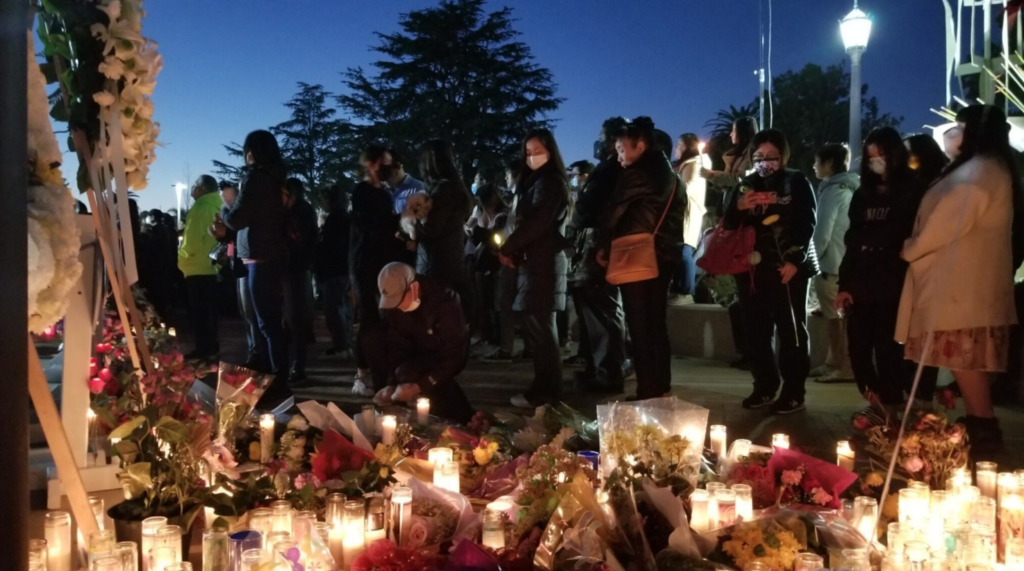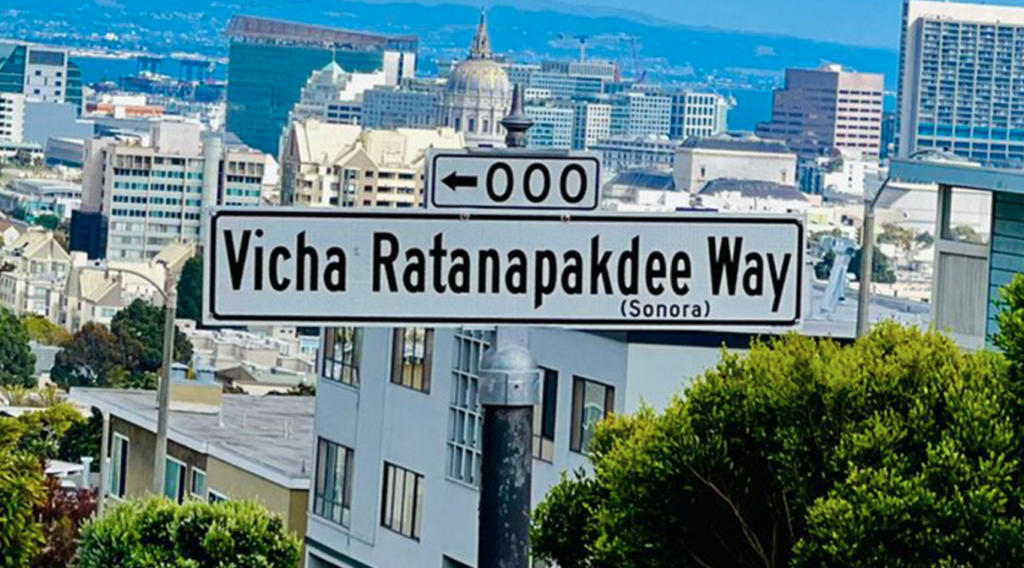For Asian Americans, January brings memories of tragedy and hope for change

Mourners gather at a vigil for the victims of the Monterey Park mass shooting. Among those killed was Valentino Alvero, a 68-year-old Filipino American who was fondly remembered by his family as the “life of any party.” Photo from the City of Monterey Park
For most Americans, January brings with it the same seemingly intractable divisions that plagued the country last year and years prior. Yet for Asian Americans, the month is a solemn time of remembrance, filled with painful reminders of the violence that has targeted their communities.
It also brings important lessons on the potential that tragedy has to be a catalyst for real change.
Among the prominent January incidents:
- January 6, 2020: 89-year-old Yik Oi Huang died after injuries from a severe beating as she walked in a neighborhood park near her San Francisco Visitacion Valley home;
- January 11, 2023: a public bus rider in Bloomington, IN vowed to rid the country of Chinese while repeatedly stabbing a 17-year-old student;
- January 15, 2022: 40-year-old Michelle Alyssa Go was fatally pushed in front of an oncoming subway train in New York’s Times Square;
- January 17, 1989: a white nationalist with a semiautomatic rifle killed five children at a Stockton CA elementary school yard and injured about 30 others;
- January 21, 2023: an elderly Asian man with a semi-automatic pistol killed 11 people and injured 9 as they celebrated the lunar new year at a ballroom in Monterey Park, CA. Among those killed was Valentino Alvero, a 68-year-old Filipino American who was fondly remembered by his family as the “life of any party”;
- January 23, 2023: in Half Moon Bay, CA, a 66-year-old male farmworker killed five fellow Chinese and two Latino coworkers;
- January 28, 2021: Vicha Ratanapakdee, an 84-year-old Thai American grandfather, died after being violently shoved as he went for a walk near his San Francisco home.
I’ve been tracking lists like this for 41 years, ever since I was part of the civil rights movement to seek justice for Vincent Chin after he was beaten to death in Detroit by two white killers in a climate of hate. While such incidents are but a fraction of what Asian Americans have long experienced, most recently after 9/11 and Covid, these tragic events offer a window into a much more dynamic, nuanced and hopeful picture.
This January, Asian American communities across the US have been actively organizing efforts to address the systemic fault lines that contribute to violence. Instead of being depicted as disempowered victims, several remembrances highlight their communities’ resilience and efforts to build bridges.
For example, at Indiana University, a Chinese American graduate student in the music department was so outraged by the lack of official response to the stabbing that she composed a musical score and organized a public event to bring diverse communities together to remember and support the attacked student. In addition, a grass roots feminist group is launching HAAP, Hoosier Asian American Power, to organize and educate in every corner of the state.

Vicha Ratanapakdee Way in San Francisco, named for the elderly Thai immigrant whose killing became a rallying cry against anti-Asian hate. Photo from Ethnic Media Services
The Half Moon Bay shootings exposed the terrible living conditions of farmworkers in the scenic Pacific coast town—and the surprising cluster of elderly, non-English speaking Chinese workers. Spanish language services were available for the Mexican workers, but local officials scrambled to find language access for the traumatized Chinese workers.
The mass shootings at Half Moon Bay and Monterey Park were not hate crimes in legal terms, but Asian American advocates against hate violence mobilized into a cooperative, inter-county effort with coastal officials. San Francisco based groups from StopAAPIHate/Chinese for Affirmative Action offered emergency assistance; Self-Help for the Elderly managed in-language social service support of housing, medical and mental health assistance; and the Asian Pacific Fund raised money to help the service agencies with their additional load. Collaboration with Latino farmworker groups and local officials has launched a groundbreaking farmworker housing project.
In the 1980s, a depressed American economy fueled widespread anti-Japan hatred and anti-Asian attacks throughout the decade. But Asian Americans were so invisible that liberal lawyers even argued that Vincent Chin wasn’t protected by federal civil rights law because, they wrongly claimed, Asians weren’t in the US in the 1800s (Asians have been documented in America since at least the 1700s). To counter such ignorance and erasure, Asian Americans in Detroit organized a national, multiracial civil rights movement calling for equal justice and an end to hate violence.
Turning tragic events into action and change has been a continuing legacy in Asian American communities. Even though the Stockton elementary school where Cambodian, Vietnamese and Lao schoolchildren were shot to death was overwhelmingly Southeast Asian, the police chief declared on that same day that race was not a factor. But the community activists called on the state attorney general to lead an investigation—which soon found the killer’s white supremacist ties and that he was known for his anti-Asian racism.
Asian American activism in the wake of violence has been critical because many other families and communities have also encountered systemic refusal to acknowledge anti-Asian racism. As recently as 2022, a gunman in Atlanta drove miles in search of Asian American spa businesses for his killing spree that left eight people dead, including six Asian American women workers. Within 24 hours, the county sheriff dismissed race as a motive, saying the killer was just having “a bad day.” Asian Americans around the country raised their voices, even prompting the White House to speak out.
Memorials this month in Monterey Park and Half Moon Bay also stand as recognitions of cross-sector, pan-Asian and multi-racial efforts to advance the community healing process through solidarity. On January 28, Monthanus Ratanapakdee has planned a remembrance of her father, Vicha, to be joined by Justin Go, Michelle’s father. The national “Remember Vicha” organizing efforts have succeeded in getting streets named “Vicha Ratanapakdee Way” in Los Angeles and San Francisco. The park where Yik Oi Huang was fatally attacked has also been renamed in her honor through the efforts of her granddaughter Sasanna Yee, who has worked with Asian and Black communities to keep the attack from inflaming racial tension.
A shining example of how acting for change can lead to personal transformation, Brandon Tsay, the 27-year-old hero who stopped the Monterey Park gunman from continuing his rampage in Alhambra, organized a commemoration event this week at his family’s dance studio to remember and “to celebrate resilience and unity.” After last year’s shootings, Tsay has spoken at Asian American events around the country, inspiring others, especially young people like himself, to get involved in their communities, and started a fund to raise mental health awareness with money that was donated to him.
While January brings remembrances of lives lost to violence, the efforts of Asian Americans and others also show how healing can come when people act together in solidarity to build a beloved community of equity and justice, where violence and hate towards any people has no place.
Helen Zia is a writer and the founder of the Vincent Chin Institute, Vincentchin.org to build solidarity against hate and anti-Asian bigotry through education, narrative and advocacy.

